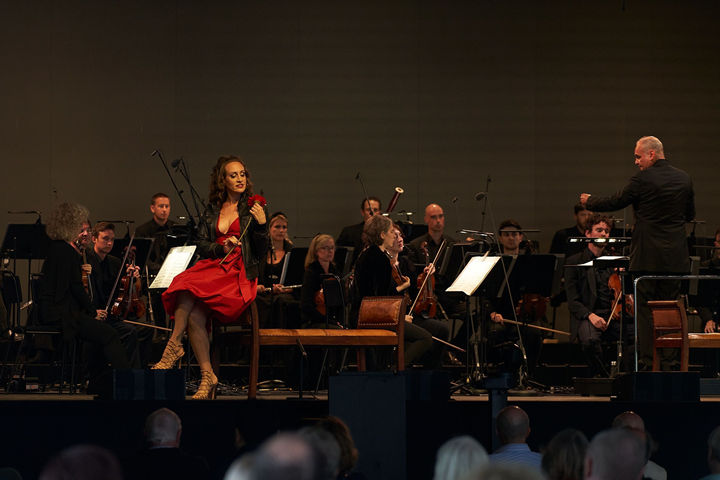| Opera Reviews | 25 April 2024 |
Less is more in this stylish performanceby Catriona Graham |
|
Strauss, R: Ariadne auf Naxos |
|

Brenda Rae (Zerbinetta)
|
|
|
For the final offering in the Edinburgh International Festival opera programme, there is a semi-staged performance of Richard Strauss’s Ariadne auf Naxos. On the wide stage of the polytunnel, the action takes place in front of the RSNO, conducted by Lothar Koenigs, aided only by 3 bench seats and a few other props. The action starts with a masterly implacable Major-Domo (Thomas Quasthoff in a speaking part) discussing the evening’s arrangements with an increasingly incensed Music Master (Martin Gantner). That exchange sets the tone, interrupted as it is by various other characters. Catriona Morrison is an excellent Composer, catching the intensity and enthusiasm of youth, offended by the cynicism of the Dancing Master – Peter Bronder captures the worldly wisdom of the experienced theatre professional with an offhand elegance – but is talked around by Gantner’s almost paternal advice. Brenda Rae is a superficially flippant Zerbinetta, hiding her feelings beneath a stylish veneer. Touching as her Act 1 ‘moment’ with the Composer is, she really shows her class in her Act 2 coloratura aria ‘Grosssmächtige Prinzessin’ where she conveys so much using only voice, gesture and facial expression. Together with her dancing boys, she effectively undercuts Ariadne’s tragedy queen tendencies. The boys – Joshua Hopkins, Alexander Sprague, Barnaby Rea and Sunnyboy Dladla – gleefully camp things up, each with their inflatable palm tree, in their efforts to ‘win’ the hand of Zerbinetta. As Ariadne, Dorothea Röschmann both is a diva and acts like one. Abandoned by Theseus on a deserted island, she has decided to die, when Zerbinetta and the boys arrive. Ariadne’s reaction is to throw her chiffon scarf over her head like a veil. The trio of Naiad, Dryad and Echo – Liv Redpath, Claire Barnett-Jones and Soraya Mafi - are more sympathetic, if anything encouraging her in her negativity. Their singing is powerful, charged with the mixed and emerging emotions. Given the current distancing restrictions, they circle each other as they vent their feelings. The duet culminates in them reaching out to each other, tentatively, till their fingertips touch, then they walk off. Somehow, after the music they have made, that is enough. Strauss’s and Hofmannsthal’s opera is of two contrasting halves and, as a result, can sometimes be regarded as difficult to get right. Louisa Muller’s staging, given the constraints of the stage and restrictions, lacks the busyness and business of many fully-staged productions. The principals have to put over the story and music using only voice and gesture – and this they have done very well. This is a stylish performance from both principals and orchestra, yet another example of less being decidedly more. |
|
| Text © Catriona Graham Photo © Matt Beech |
|







